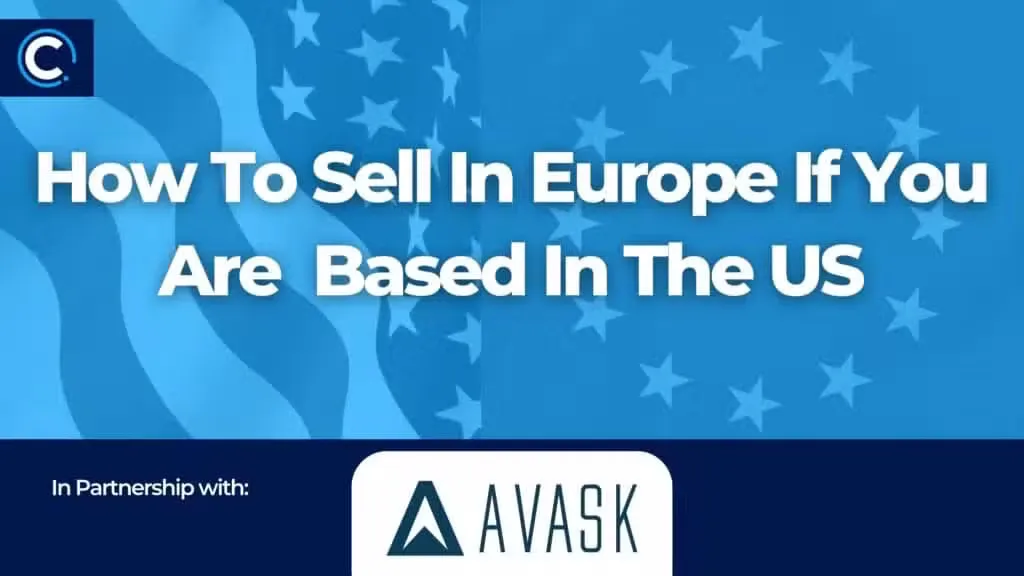Book a FREE 15-minute consultation with an expert – Book Now
Selling in Europe if You are Based in the US

Expanding your business to Europe can be an exciting venture, but it is important to understand the lie of land when you take this step. The EU can seem to have a complex approach to tax laws and eco contributions, so it’s key to get a clear understanding of these issues to ensure that your expansion is successful. In this blog post, we will explore each of these topics in more detail.
Tax Laws:
When expanding your business to Europe, it is important to understand the tax laws in each country where you plan to operate. Each country has its own tax laws, and it is important to comply with them to avoid any legal issues. You may also want to consider tax consultant with knowledge of the local rules to help you navigate the tax laws and regulations in each country.
If you are an e-commerce seller based in the United States selling products in the European Union (EU), you may be subject to various tax laws and regulations in both the US and the EU. Here are some key tax laws that may affect US e-commerce sellers selling in the EU:
Value-Added Tax (VAT): Like EU-based Amazon sellers, US e-commerce sellers selling in the EU may also be required to register for VAT in the countries where they store inventory or make sales. This requires obtaining a VAT registration number, collecting and remitting VAT on sales, and complying with local VAT regulations.
Customs Duties and Taxes: If you ship goods to customers in the EU from the US, you may be subject to customs duties and taxes, which can vary depending on the country of destination and the type of product.
Sales Tax: In the US, e-commerce sellers may also be subject to sales tax on their sales, depending on the state where they are based and where their customers are located. Some US states have enacted economic nexus laws that require sellers to collect and remit sales tax if they meet certain sales thresholds in that state.
Income Tax: US e-commerce sellers selling in the EU may also be subject to income tax on their profits, both in the US and in the EU. This requires complying with both US and EU tax laws and filing tax returns in both jurisdictions.
It’s important for US e-commerce sellers selling in the EU to understand and comply with these tax laws and regulations to avoid penalties and legal issues. Consulting with a tax professional who specializes in international tax laws can be helpful in ensuring compliance with the laws and regulations of both the US and the EU.
Eco Contributions:
In Europe, there is a growing emphasis on sustainability and reducing environmental impact. As such, many countries have implemented eco contributions, which are taxes or fees on products that are considered environmentally harmful. These eco contributions are designed to encourage businesses and consumers to make more environmentally-friendly choices.
A key contribution is EPR which stands for Extended Producer Responsibility. It is a concept that is designed to make manufacturers and producers of goods responsible for the environmental impact of their products throughout the product’s lifecycle, from production to disposal.
The EU has adopted EPR as part of its waste management policies, and many EU countries have implemented EPR programs for various products.
Examples of products that may be subject to eco contributions include plastic bags, batteries, and electronics. If your business sells products that are subject to eco contributions, you will need to ensure that you are complying with the regulations in each country where you operate.
In conclusion, expanding your business to Europe can be a great opportunity, but it is important to understand the tax laws, eco contributions, and Customs Duties to ensure that your expansion is successful. By doing your research and working with expert consultants, you can navigate the regulations and laws in each country and grow your business in Europe.
Need help with this topic? our partners at AVASK are at your service, send us an email via our contact form and we will refer you to them.
Legal Disclaimer: The articles published on our platform are for informational purposes only and do not constitute legal advice in any form. They are not intended to be a substitute for professional legal counsel. For any legal matters, it is essential to consult with us or a qualified attorney who can provide advice tailored to your specific situation. Reliance on any information provided in these articles is solely at your own risk.
Amazon Brand Registry – Discover for Free if You’re Eligible
Increase Your Chance of Getting a
Trademark to 96%
Subscribe to Our Newsletter
Sign up to receive valuable information on E-Commerce and intellectual property